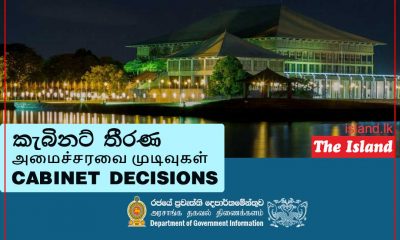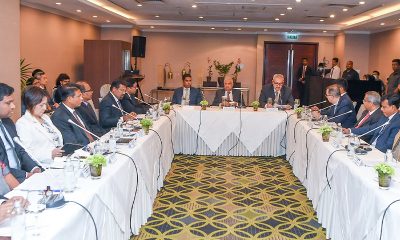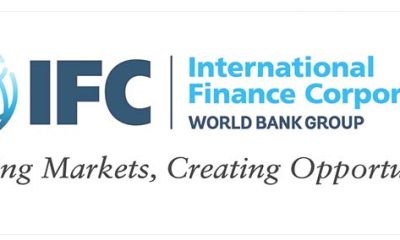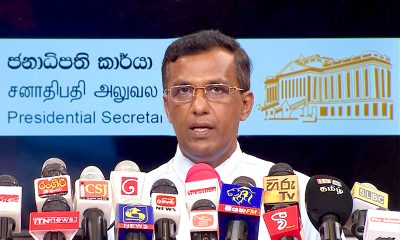News
Lanka past worst of its crisis but behind in growth -WB

Output growth of South Asian countries, except Sri Lanka, is projected to remain stronger than in other regions of the world in the coming years, as per the World Bank’s latest South Asia Development Update, ‘Toward Faster, Cleaner Growth’.
Growth in the region is stronger than elsewhere in the world, but it is nonetheless not strong enough for Sri Lanka to reach high-income status within a generation, the report says.
At just under 6 percent, output growth in South Asia is expected to remain stronger than in other regions in 2023-25, even with weak growth in the countries recovering from recent balance of payments crises.
While other economies in the region are growing fast Afghanistan, Pakistan and Sri Lanka are in acute crisis
Sri Lanka has continued to suffer from the aftermaths of recent balance-of-payments crises. It has recently begun to implement IMF-supported policy programmes to stem capital outflows and improve debt sustainability. Activity has continued to be hampered by input shortages related partly to higher import costs and supply disruptions associated with remaining import restrictions as fiscal deficits remain large, while current account deficits have improved amid sharp import compressions.
Sri Lanka’s economy has suffered the most severe contraction but appears to be past the worst of its crisis, with shortages of essential inputs easing and tourism recovering. The services PMI (Purchasing Managers Index) has been in expansionary territory since May 2023. Industrial production has been contracting since late 2021, but more slowly recently.
In Sri Lanka, inflation peaked around 70 percent year-on-year in September 2022 but has since slowed sharply as the effects of last year’s currency depreciation have faded. Unlike other central banks in the region, the Central Bank of Sri Lanka has been cutting its policy rates since June, in response to steep disinflation and economic contraction.
Among the south Asian nations, financial stresses were most severe in Pakistan and Sri Lanka. In Pakistan, the rupee depreciated sharply between early 2022 and early 2023, and has been broadly stable since. Last year’s attempts to limit capital outflows through import and capital controls diverted remittance inflows from formal channels, contributing to shortages of foreign currency. In Sri Lanka, the rupee has appreciated modestly since the beginning of the year, partially reversing last year’s depreciation of more than 40 percent against the U.S. dollar. Remittances have rebounded as the economy has stabilized, although they remain well below 2019 levels. There has also been a recovery in tourism earnings. In both Pakistan and Sri Lanka, foreign reserve coverage is low, asset quality is weak in both the bank and non-bank financial sectors, and buffers against future shocks are thin.
“In Sri Lanka, the economy appears to have bottomed out after its severe recession and is showing signs of recovery. Support from the IMF and other external lenders has helped stabilize the currency and ease import shortages. The economy is also being supported by the recovery of tourism. After contracting by 3.8 percent in 2023, the economy is expected to grow by 1.7 percent in 2024 and 2.4 percent in 2025. The country’s path to recovery is very narrow, however. Its limited fiscal and reserve buffers leave little room for error as it implements a broad set of reforms and restructures its external debt,” the report says.
News
US sports envoys to Lanka to champion youth development

The U.S. Embassy in Colombo welcomed the U.S. Sports Envoys to Sri Lanka, former National Basketball Association (NBA) and Women’s National Basketball Association (WNBA) players Stephen Howard and Astou Ndiaye, from June 8 through 14.
The Public Diplomacy section of the U.S. Embassy said that it would launch a weeklong basketball program intended to harness the unifying power of sports, made possible through collaboration with Foundation of Goodness and IImpact Hoop Lab.
While in Sri Lanka, Howard and Ndiaye, both retired professional basketball players, will conduct a weeklong program, Hoops for Hope: Bridging Borders through Basketball. The Sports Envoys will lead basketball clinics and exhibition matches and engage in leadership sessions in Colombo and Southern Province for youth aged 14-18 from Northern, Uva, Eastern and Western Provinces, offering skills and leadership training both on and off the court. The U.S. Envoys will also share their expertise with the Sri Lanka Basketball Federation, national coaches, and players, furthering the development of basketball in the country. Beyond the clinics, they will collaborate with Sri Lankan schoolchildren to take part in a community service project in the Colombo area.
“We are so proud to welcome Stephen and Astou as our Sports Envoys to Sri Lanka, to build on the strong people-to-people connections between the United States and Sri Lanka,” said U.S. Ambassador Julie Chung. “The lessons that will be shared by our Sports Envoys – communication, teamwork, resilience, inclusion, and conflict resolution – are essential for leadership development, community building, equality, and peace. The U.S. Sports Envoy program is a testament to our belief that sports can be a powerful tool in promoting peace and unity.”
News
Rahuman questions sudden cancellation of leave of CEB employees

SJB Colombo District MP Mujibur Rahuman in parliament demanded to know from the government the reasons for CEB suspending the leave of all its employees until further notice from Thursday.
MP Rahuman said that the CEB has got an acting General Manager anew and the latter yesterday morning issued a circular suspending leave of all CEB employees with immediate effect until further notice.
“We demand that Minister Kanchana Wijesekera should explain this to the House. This circular was issued while this debate on the new Electricity Amendment Bill was pending. There are many who oppose this Bill. The Minister must tell parliament the reason for the urge to cancel the leave of CEB employees,” the MP said.However, Speaker Mahinda Yapa Abeywardena prevented Minister Wijesekera responding to the query and said that the matter raised by MP Rahuman was not relevant.
News
CIPM successfully concludes 8th Annual Symposium

The Chartered Institute of Personnel Management (CIPM) successfully concluded the 8th Annual CIPM Symposium, which took place on 31st May 2024. Themed “Nurturing the Human Element—Redefining HRM in a Rapidly Changing World,” the symposium underscored the pivotal role of human resource management (HRM) in today’s dynamic global landscape. Since its inception in 1959, CIPM has been dedicated to advancing the HR profession through education, professional development, and advocacy, solidifying its position as Sri Lanka’s leading professional body for HRM.
Ken Vijayakumar, the President of the CIPM, graced the occasion as the chief guest. The symposium commenced with the welcome address by the Chairperson, Prof. Arosha Adikaram, followed by the Web Launch of the Symposium Proceedings and Abstract Book by the CIPM President. The event featured distinguished addresses, including a speech by Chief Guest Ken Vijayakumar, President of CIPM, and an address by Guest of Honor Shakthi Ranatunga, Chief Operating Officer of MAS Holdings Pvt. Ltd., Sri Lanka.
The symposium also featured an inspiring keynote address by Prof. Mario Fernando, Professor of Management and Director of the Centre for Cross Cultural Management (CCCM) at the University of Wollongong, Australia.
Vote of Thanks of the inauguration session was delivered by Dr. Dillanjani Weeratunga, Symposium Co-chair.
The symposium served as a comprehensive platform for researchers to present their findings across a wide range of critical topics in HRM. These included Cultural Diversity and Inclusion, Talent Development and Retention, Ethical Leadership and Corporate Social Responsibility, Adapting to Technological Advancements, Mental Health and Well-being at Work, Global Workforce Challenges, Employee Empowerment, and Reskilling and Upskilling.
The plenary session was led by Prof. Wasantha Rajapakse. Certificates were awarded to the best paper presenters during the valedictory session, followed by a vote of thanks delivered by Kamani Perera, Manager of Research and Development.
The annual symposium of CIPM was a truly inclusive event, attracting a diverse audience that spanned undergraduates, graduates, working professionals, research scholars and lecturers. This widespread interest highlights the symposium’s significance in the field of HRM, offering a unique opportunity for everyone to network and learn from scholarly brains.The CIPM International Research Symposium was sponsored by Hambantota International Port, Sri Lanka Institute of Information Technology (SLIIT), E B Creasy & Co. PLC, and Print Xcel Company.
























